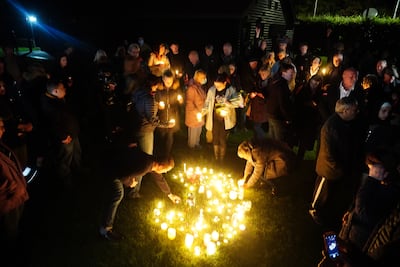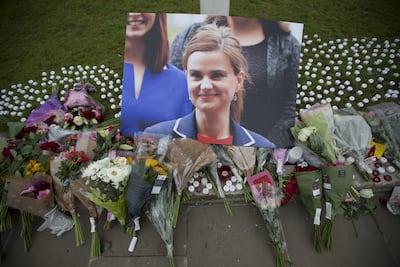The man arrested on suspicion of killing British politician Sir David Amess has been named as Ali Harbi Ali, as investigators widened the focus of the inquiry after the "unfathomable" incident.
Detectives have until Friday to question the suspect after he was detained under the Terrorism Act, which allowed them to extend his detention, authorities said. The investigation is being led by Scotland Yard's Counter Terrorism Command and officers are exploring "a potential motivation linked to Islamist extremism".
Veteran Conservative MP Amess, 69, was talking to voters at a church in the small town of Leigh-on-Sea, east of London, when he was stabbed to death on Friday.
Mr Ali, 25, a British citizen of Somali heritage, had been referred to the UK's scheme for those thought at risk of radicalisation a few years ago. He didn't spend long on the Prevent voluntary programme and the move has reopened calls for a better resourced, revamped scheme.
Priti Patel, the Home Secretary, said on Sunday that Prevent would be a vital part of the government's response to the attack. "Prevent is going through an independent review right now. It’s timely to do that, we have to learn, we obviously constantly have to learn, not just from incidences that have taken place but how we can strengthen our programmes," she said.
"We want to ensure that it is fit for purpose, robust, doing the right thing but importantly learning lessons, always building upon what is working and addressing any gaps or issues where the system needs strengthening."
Police and security services believe Ali acted alone. British media reports suggested he may have been "self-radicalised" and inspired by Al Shabab, the Al-Qaeda-linked extremists in Somalia.
His father, Harbi Ali Kullane, a former adviser to the prime minister of Somalia, said he felt "very traumatised".
"It's not something I expected or even dreamt of," he told The Sunday Times while confirming his son had been apprehended.
Police said they had been carrying out searches at three addresses in the London area in a "fast-paced investigation".
It was reported the Mr Ali stabbed Amess multiple times in the presence of two women staff, before sitting down and waiting for police to arrive. He is believed to have booked an appointment the previous week.
“The family would like to thank everyone for the wonderful, wonderful tributes paid to David following his cruel and violent death. It truly has brought us so much comfort. The support shown by friends, constituents and the general public alike has been so overwhelming. As a family it has given us strength," said the family of Sir David Amess in a statement released on Sunday.
“We have realised from tributes paid that there was far, far more to David than even we, those closest to him, knew.
“We are enormously proud of him. Our hearts are shattered. However, there was still so much David wanted to do – this we know from the events of the last few days. So, this is not the end of Sir David Amess MP. It is the next chapter and as a family we ask everyone to support the many charities he worked with. There are so many to mention, so find one close to your hearts and help.
“Strong and courageous is an appropriate way to describe David. He was a patriot and a man of peace. So, we ask people to set aside their differences and show kindness and love to all. This is the only way forward. Set aside hatred and work towards togetherness.
“Whatever one’s race, religious or political beliefs, be tolerant and try to understand.
“As a family, we are trying to understand why this awful thing has occurred. Nobody should die in that way. Nobody.
“Please let some good come from this tragedy.
“We are absolutely broken, but we will survive and carry on for the sake of a wonderful and inspiring man.
“We ask at this time that the family’s privacy be respected so that we can grieve in private.”
On Saturday evening, hundreds of mourners attended a candlelit vigil at a sports field near the scene of the crime, holding a minute's silence in the MP's memory.

Prime Minister Boris Johnson visited the scene to pay his respects on Saturday, laying floral wreaths outside the church with the leader of the opposition, Labour's Sir Keir Starmer, in a rare show of unity.
Local residents including members of the Muslim community also placed bouquets next to the police tape.
Security of politicians placed under spotlight
Ms Patel on Friday ordered police across the country to review security arrangements for all 650 MPs and The Sunday Times reported that every member could be granted security protection when meeting the public.
"We will carry on ... we live in an open society, a democracy. We cannot be cowed by any individual," Ms Patel told journalists after laying a wreath for her fellow Essex MP.
Tobias Ellwood, a Conservative MP who tried to save a stabbed police officer during a 2017 terrorist attack near the Houses of Parliament, on Twitter called for "a temporary pause in surgeries, or face-to-face meetings with constituents, until the security review is complete".
MPs and their staff have been attacked before, although it is rare. But their safety was thrown into sharp focus by Brexit, which stoked deep political divisions and has led to often angry, partisan rhetoric.
In June 2016, Labour MP Jo Cox was killed by a far-right extremist, prompting demands for action against what lawmakers said was "a rising tide" of public abuse and threats against elected representatives.
House of Commons Speaker Lindsay Hoyle wrote in The Observer that "we need to take stock" and review whether security measures introduced after the murder of Cox were "adequate to safeguard members, staff and constituents, especially during surgeries".
A specialist police unit set up to investigate threats against MPs in the aftermath of Cox's murder said 678 crimes against politicians were reported between 2016 and 2020.

Amess himself wrote about public harassment and online abuse in his book, Ayes & Ears: A Survivor's Guide to Westminster, published last year.
"These increasing attacks have rather spoilt the great British tradition of the people openly meeting their elected politicians," he said.
MPs had to install security cameras and meet constituents only by appointment, he said.
Unlike some MPs, Sir David publicised meeting times for constituents on Twitter and held them in public places, while asking people to book in advance.




















